111 GEORGE ST WEST | ST. JOHN'S NL | CANADA | A1C 6K2 | 709 739-7111 | emmabutlergallery@nl.rogers.com
ON PAPER
An Online Print Exhibition
INTAGLIO
Intaglio is an umbrella term for several techniques, including etching, engraving, drypoint, aquatint, and mezzotint. Intaglio comes from the Italian word intagliare, which means to incise. The most common intaglio technique is etching, where the artist scratches an image onto a metal plate covered with wax. This plate is then submerged in acid which eats into the metal exposed by the scratched lines. Ink is then beaten into the incised lines and dampened paper is placed over the plate and run through the printing press. The pressure forces the paper into the etched lines to pick up the ink, printing the image in reverse.
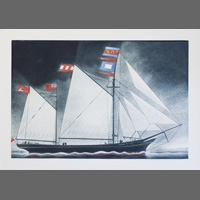 David Blackwood
Barbour's Seabird Leaving Newtown (1998)
Etching and aquatint, 24 x 36 (34/75) |
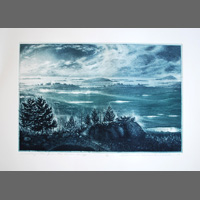 David Blackwood
Wesleyville from the Alder Ridge (2009)
Etching and aquatint, 12 x 18 (23 x 28.5 framed) |
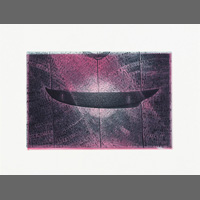 David Blackwood
Dante's Barque (2011)
Etching and aquatint, 8 x 12 (21 x 24.5 framed) (23/50) |
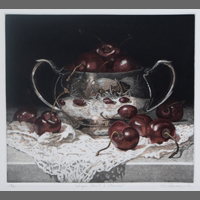 Susan Paterson
Sugar Bowl and Cherries (2017)
Etching, 8 x 9 |
 Jean Claude Roy
Ile aux Marins (1994)
Mezzotint 14.5 x 17.5 (34/40) |
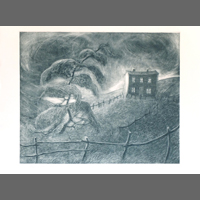 Jean Claude Roy
Cape Shore 1988)
Mezzotint, 19.5 x 23.5 (22/30) |
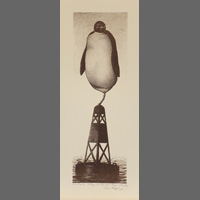 Dave Sheppard
A Buoy and a Chain for a Penguin in Purgatory (2004)
Etching, 13 x 4.25 (V. I/II 7/27) |
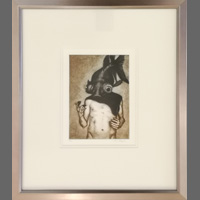 Dave Sheppard
The Black Moor
Etching, 7 x 5 (17 x 15 framed) (6/25) |
 Dave Sheppard
The Muse I
Etching, 5 x 7 (16/23 VE) |
 Dave Sheppard
The Jellyfish
Etching, 7 x 5 (I/II 16/18) |
 Dave Sheppard
The Skeleton
Etching, 7 x 5 (1/20) |
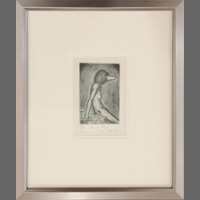 Dave Sheppard
Figure Study 1
Drypoint 4 x 3 (14 x 12 framed) 12/15 |
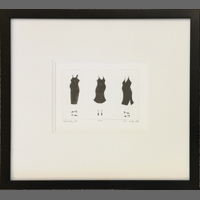 Lori Doody
Fashionably Late
Etching 4 x 6 (14 x 15 framed) (3/8 VE) |
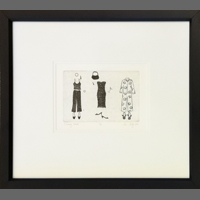 Lori Doody
Dressed to the Nines
Lithograph, 16 x 13 (4/12) |
LITHOGRAPHY
Lithography is based on the resistance between grease and water. The artist draws on stone with a greasy substance. The stone is then treated with a chemical solution that ensures the image will attract the printing ink while the blank areas repel the ink and attract water. Ink is applied and sticks only to the greasy drawn sections. Paper is then laid on the stone and run through a printing press to transfer the image. Separate stones are used for complex images of multiple colours.
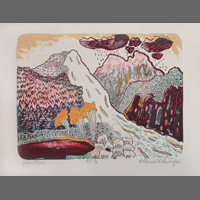 Anne Meredith Barry
Yellow Trees (1992)
Lithograph, 12 x 16
each 10 x 7.5 (P.P. 2/3)
|
 Anne Meredith Barry
Tors Cove Spring
Lithograph, 10 x 12 (PP II/III) |
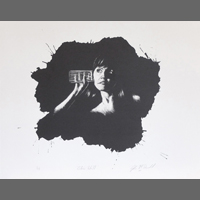 John McDonald
Glass Wall (2007)
Lithograph 16 x 17 (5/8) |
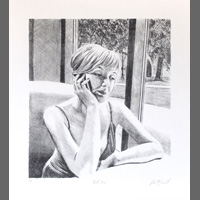 John McDonald
The Rest Stop (2010)
Lithograph, 16.5 x 15 (1/15) |
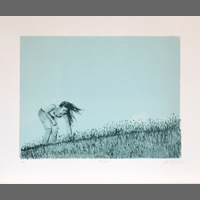 John McDonald
The Find (2010)
Lithograph, 12.5 x 16.5 (15/15) |
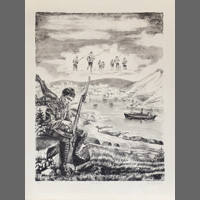 John McDonald
The Return (2014)
Lithograph, 25 x 19 (15/30) |
 Lori Doody
Little Black Dresses
Lithograph, 15 x 12.5 (7/12) |
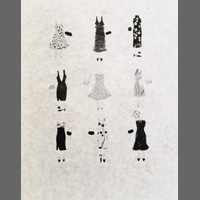 Lori Doody
Dressed to the Nines
Lithograph, 16 x 13 (4/12) |
WOODCUT
Woodcut is the oldest printmaking process. In this technique, the image is sketched on a block of wood before the surface is carved into with gouging tools. The resulting raised areas of the block are then inked using a roller. A sheet of paper is placed on top and pressure is applied, leaving the impression of the raised areas in reverse. Separate blocks are used for each colour.
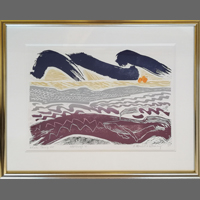 Anne Meredith Barry
Whale Song #8 (1989)
Woodblock, 18 x 25 (29 x 34 framed)
(AP 1/1 edition 9) |
SERIGRAPHY
Serigraphy is an artistic form of screen printing or stenciling. In this process, mesh (originally silk) is stretched tightly across a frame. An image is glued or otherwise affixed to the mesh to mask out composition areas. This image can be created by a number of materials, paper, a hardening form of glue, or light-sensitive gelatins for photographic images. Unlike the other techniques, no printing press is used. Instead the ink is pushed through stencil image from above using a rubber blade or squeegee. Separate screens are used for each colour.
 Anne Meredith Barry
Bar Haven (1997)
Silkscreen, 12 x 8 (5/15) |
 Anne Meredith Barry
Cape Freels (1997)
Silkscreen, 12 x 8 (4/15) |
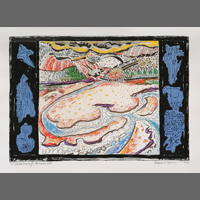 Anne Meredith Barry
Window Drawing #2 – Glenburnie Flats
Silkscreen, 18 x 27 (4/12) |
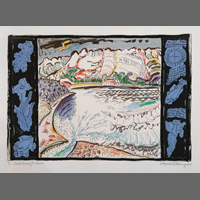 Anne Meredith Barry
Window Drawing #3 – Lomond
Silkscreen, 18 x 27 (2/15) |
 Anne Meredith Barry
Window Drawing #4 – from my studio
Silkscreen, 18 x 27 (4/14) |
 Anne Meredith Barry
Raven Stomp (1997)
Silkscreen, 11 x 9 (AP II/II) |
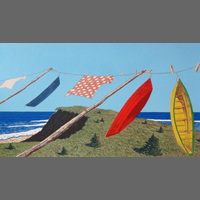 Steven Rhude
Dories on the Line
Serigraph, 16 x 28 |
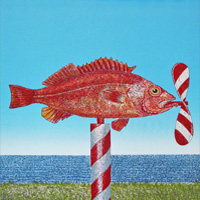 Steven Rhude
Redfish
Serigraph, 12 x 12 (23 x 23 framed) |
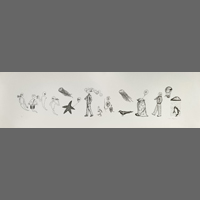 Dave Sheppard
A Parade (2005)
Serigraph 24.5 x 5 (2/16) |
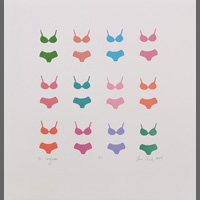 Lori Doody
The Honeymoon
Screenprint 12 x 12 (4/4) |
 Lori Doody
I Bought the Dress in Every Colour
Screenprint 12 x 12 (4/7) |



































